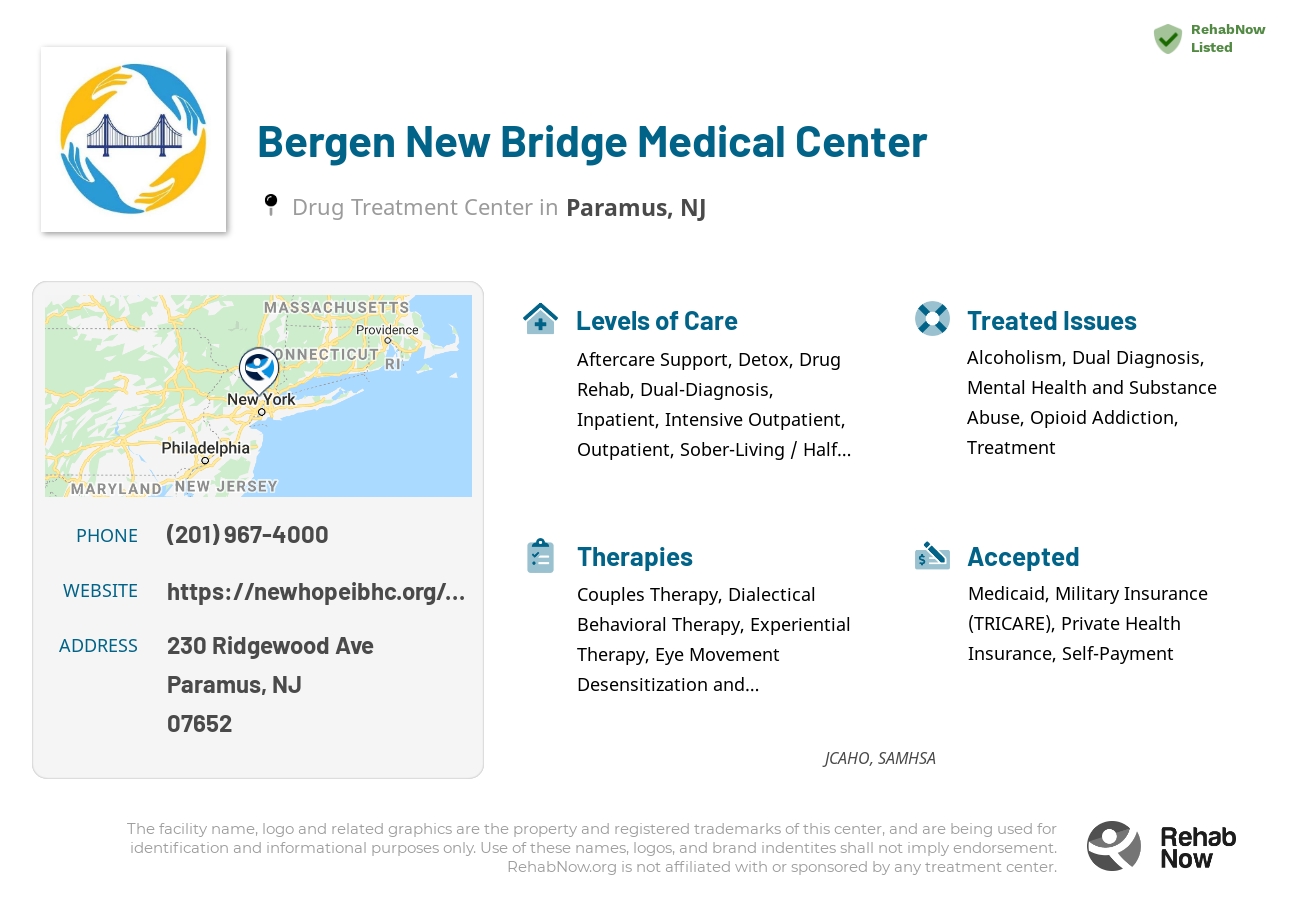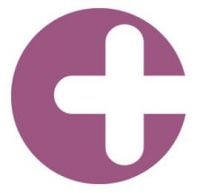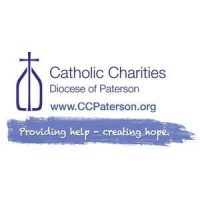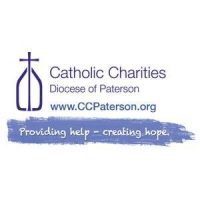Bergen New Bridge Medical Center
Drug Rehab Center in Paramus, New Jersey
Bergen New Bridge Medical Center provides patients with evidence-based, personalized and compassionate care for different levels of substance use disorder and dual-diagnosis through a comprehensive range of accredited programs, including detoxification, inpatient treatment and intensive outpatient services, with private health insurance accepted for payment.
About This Paramus, NJ Facility
Bergen New Bridge Medical Center in Paramus, New Jersey, specializes in mental health and dual diagnosis treatment for men and women. With a focus on comprehensive care, the center offers inpatient, partial hospitalization, and outpatient services across 50 beds. Its unique approach includes treating medical and psychiatric needs together for a holistic recovery.
Accredited by the Joint Commission and licensed by the New Jersey Department of Health, Bergen New Bridge Medical Center integrates evidence-based treatments like cognitive-behavioral therapy and medication-assisted treatment, ensuring high-quality, compassionate care as per its mission.
- Comprehensive Treatment: Offers a range from inpatient to outpatient services, addressing both addiction and mental health needs.
- Dual Diagnosis Focus: Specializes in treating co-occurring disorders, providing a pathway to more effective and sustainable recovery.
- Variety of Therapeutic Methods: Utilizes cognitive behavioral therapy, trauma therapy, and more, tailored to meet individual needs.
Bergen New Bridge Medical Center treats a broad spectrum of addictions and mental health issues, including anxiety, depression, bipolar disorder, and schizophrenia. With a blend of individual, group, and family therapy, alongside specialized programs for different levels of care, the center supports patients through every step of their journey toward sobriety and mental wellness.
Genders
Ages
Modality
Additional
Accreditations
SAMHSA

JCAHO
Conditions and Issues Treated
Opioid addiction involves addiction to legal or illegal opioids. It may happen very quickly with any opioid use. Sometimes within a matter of days. Opioid addiction is a known as a high-risk factor for future heroin addiction.
Opioid withdrawal can be extremely uncomfortable and lead the user to continue to use even if they want to quit. Stopping using an opioid requires careful medical observation. Sometimes the withdrawal can persist for many weeks, which can put the user at a high risk for relapse.
It is recommended to receive inpatient treatment and a medically supervised detox like those offered at Bergen New Bridge Medical Center in Paramus, NJ, NJ, to manage the withdrawal process while learning lasting tools to maintain recovery. In some circumstances medications can be used to manage opioid addiction.
Substance use disorder falls under two categories: Alcohol or Drug Abuse and Drug Dependence. An individual suffering from a substance use disorder and mental health disorders is said to have a co-occurring disorder or a dual disorder. Individuals in Paramus, NJ with substance use disorders and mental health problems are said to suffer from a ‘dual diagnosis’.
The most frequently identified mental health issues found in individuals with substance use disorders include anxiety, depression, schizophrenia, and schizoaffective disorder.
Levels of Care Offered
This center offers a variety of custom treatment tailored to individual recovery. Currently available are Aftercare Support, Detox, Drug Rehab, Dual-Diagnosis, Inpatient, Intensive Outpatient, Outpatient, Residential, Sober-Living / Half-Way, with additional therapies available as listed below.
Detox is the first step of rehab. It involves giving a person time to get the toxins out of their body. During detox, the patient gets ill, and they will often start using again to get rid of these unpleasant feelings. That’s why it’s important to have a medical professional at Bergen New Bridge Medical Center present. A medical professional will make sure patients don’t start using during detox. They will also likely provide medication to ease their symptoms and coach them through on a mental level.
Inpatient rehab programs like what’s offered at Bergen New Bridge Medical Center in Paramus, NJ are ideal for covering all the bases that surround one’s addiction. It’s considered the most comprehensive approach to care for people afflicted with addiction. Patients live in a facility where they have access to therapy and medical care 24/7.
Intensive outpatient programs are an integral part of the continuum of care for people addicted to drugs and alcohol. Most intensive outpatient programs in Paramus, NJ comprise a 3-hour session three times a week. Usually, the intensity of these programs diminishes over time. These programs offer a range of services, including counselling, medical treatment, and monitoring alcohol and drug use. The programs are ideal for people who do not need treatment at an inpatient or residential facility and continue to need extended care and support.
Outpatient treatment is treatment that occurs when a patient is not checked into a rehab facility. The patient may show up for therapy sessions, go through detox and engage in other therapies to help them recover. However, they will do so while they live at home in New Jersey.
Outpatient therapy provided by Bergen New Bridge Medical Center is usually recommended as a follow up to inpatient therapy. It helps patients adapt to their normal lives after treatment. In some cases, it can also be an alternative to inpatient treatment. People may choose this route if they are unable to leave their jobs, children or if they don’t have the money for inpatient treatment. However, inpatient treatment is the best way to recover from addiction.
A sober living home functions as a bridge between the real world and an inpatient facility. Residents of an SLH in Paramus, NJ can come and go whenever they want. There are certain rules that residents have to follow, such as curfews and group meeting attendance. The SLH at Bergen New Bridge Medical Center provides freedom and structure to help readjust to life outside of rehab. It gives structure and accountability in life for staying motivated to abstain from substances.
Residential treatment programs are those that offer housing and meals in addition to substance abuse treatment. Rehab facilities that offer residential treatment allow patients to focus solely on recovery, in an environment totally separate from their lives. Some rehab centers specialize in short-term residential treatment (a few days to a week or two), while others solely provide treatment on a long-term basis (several weeks to months). Some offer both, and tailor treatment to the patient’s individual requirements.
Aftercare support involves the support given to a Paramus, New Jersey patient after they complete treatment. It helps them adjust to normal life. It may include setting them up in a halfway house and enrolling them in programs like Narcotics Anonymous (NA) and Alcoholics Anonymous (AA). Bergen New Bridge Medical Center‘s patients may also be provided with career training to help them get back into the job force.
Bergen New Bridge Medical Center‘s Therapies & Programs
Individual therapy aims to identify the core issues that would have led the patient to substance abuse and address the root cause effectively. Patients find the therapist as a person who they can trust. It helps them to open up and discuss personal and sensitive issues, which they may not be comfortable discussing in a group.
Couples therapy is an approach wherein the patients and their partners are engaged together as a part of the treatment process. When a person becomes a victim of substance abuse, it affects the patient and the people around him, particularly his partner. Their relationship can become strained due to lack of communication, financial issues, loss of trust, lack of intimacy, and physical abuse in more severe cases.
Couples therapy addresses these issues and tries to rebuild the trust between the partners. The partner’s involvement in the process will result in greater chances of treatment success and sustained recovery.
Family therapy is a set of therapeutic approaches that assumes that the entire family is a system. It utilizes the strengths and resources of the family to help the patient refrain from resorting to substance abuse. It helps to repair relationships and improve communication between family members.
Group therapy happens at Bergen New Bridge Medical Center in a controlled group environment, as opposed to a one-on-one setting. It supports Paramus, NJ patients’ recovery by offering a sense of comfort and letting them know that they are not alone. Through shared conversations, patients also learn to develop faith and understanding and gain insight on their addictions.
Dialectical Behavior Therapy (DBT) is an improved version of Cognitive Behavioral Therapy (CBT). DBT is a treatment of choice for people suffering from self-harming behaviors characterized by cutting and suicidal thoughts or inclinations.
This treatment is developed to help individuals recognize their thought patterns, behaviors, and feelings. It has demonstrated its effectiveness for people that are finding it difficult to control their emotions and urges. Conditions such as obsessive-compulsive disorder and borderline personality disorder also benefit from DBT as it imparts individuals stress-management techniques and enhanced self-esteem so they can sustain their sobriety by reducing the impact of triggers and out-of-control emotions.
Cognitive behavioral therapy (CBT) is a way of addressing concerns through talking. It can be used in individual counseling sessions. Talking through issues with professionals at Bergen New Bridge Medical Center can identify sources of discomfort or unhealthy thoughts. It is a way of learning about yourself and your individual perceptions. CBT is a healthy way of addressing some behaviors which may be bringing unintended consequences in your life.
Eye Movement Desensitization and Reprocessing (EMDR) is designed to support patients in treating trauma. Patients follow a bar of light throughout the session or watch their therapist’s finger travel back and forth. All this imitates the eye movements of REM sleep. These are the same movements that enable memories to be reprocessed by the brain. This reduces the impact and reprocesses traumatic memories have individuals, reducing the desire to shelter or escape by abusing substances.
Nicotine replacement therapy (NRT) is a treatment that helps people to quit smoking. NRT reduces the withdrawal symptoms by giving nicotine in low doses. It is safe for most adults, teens and pregnant women should not undergo NRT. Research shows that the use of NRT doubles the chances of quitting smoking.
Patient Experience
Experiential Therapy at Bergen New Bridge Medical Center
Experiential therapy works on the principle that the perception of individuals determines their behavior. It is different from medication and talk therapy and suits those who have difficulty in expressing themselves and interact. Experiential therapy works by using tools and activities to recreate past experiences and encourages the release of suppressed thoughts that were responsible for the negative feelings and drug addiction.
Role-playing, arts and crafts, music, animal care, rock climbing, etc. are some of the activities used in this therapy. Gradually the individual will experience calmness and love and change their perception positively. Other than drug addiction, Experiential therapy is useful in various behavioral and eating disorders.
Payment Options Accepted
For specific insurance or payment methods please contact us.
Is your insurance accepted?
Ask an expert, call (888) 674-0062
Additional Details
Specifics, location, and helpful extra information.
Paramus, New Jersey 07652 Phone Number(201) 967-4000 Meta DetailsUpdated April 15, 2024
Staff Verified
Patient Reviews
There are no reviews yet. Be the first one to write one.
Paramus, New Jersey Addiction Information
The state of New Jersey is afflicted by the rising opioid overdose crisis and the increase in the number of residents engaging in illegal substance abuse. 90% of the 2,900 drug overdose deaths in New Jersey involved opioids in 2018. Over 1.1 million New Jersey residents reportedly use drugs in a given year. High prevalence of drug and alcohol abuse caused 14% of all deaths in the state between 2008 and 2017.
Drug overdose is now among the top 10 causes of death in Paramus, New Jersey. 29% of patients for substance abuse treatment test positive for at least one drug. In 2012 there were 3248 arrests for illicit use of drugs in Paramus. Commonly abused drugs include alcohol, heroin, marijuana, and prescription opioids. Before registering for a program, make sure to get reviews from people who have been through the program.
Treatment in Nearby Cities
- Bridgeton, NJ (122.6 mi.)
- Pemberton, NJ (75.5 mi.)
- Boonton, NJ (18.4 mi.)
- Riverton, NJ (82.4 mi.)
- Atco, NJ (92.9 mi.)
Centers near Bergen New Bridge Medical Center
The facility name, logo and brand are the property and registered trademarks of Bergen New Bridge Medical Center, and are being used for identification and informational purposes only. Use of these names, logos and brands shall not imply endorsement. RehabNow.org is not affiliated with or sponsored by Bergen New Bridge Medical Center.











